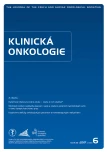The Role of Palliative Radiotherapy in Bleeding from Locally Advanced Gastrointestinal Tumors
Authors:
P. Navrátilová 1; L. Hynková 2; P. Šlampa 2
Authors‘ workplace:
Mobilní hospic Ondrášek, o. p. s., Ostrava
1; Klinika radiační onkologie LF MU, Masarykův onkologický ústav, Brno
2
Published in:
Klin Onkol 2017; 30(6): 433-436
Category:
Review
doi:
https://doi.org/10.14735/amko2017433
Overview
Background:
Patients with locally advanced gastrointestinal tumors present with typical symptoms including pain, obstructive problems with passage disorders and bleeding. The last of them negatively affects their quality of life and is potentially lethal. Palliative radiotherapy is used in hemostatic indication to control bleeding from locally advanced or recurrent inoperable gastrointestinal tumors for many years.
Purpose:
This review summarizes information and available literature about mechanisms, efficiency and toxicity of palliative radiotherapy used in hemostatic indication, separately for each part of the digestive system. Although most of the published studies are retrospective, all of them show fast, effective and technically safe control of bleeding with minimal risk of toxicity and show an improvement of quality of life. Hypofractionated radiotherapy, with a smaller number of high doses, seems to be the appropriate palliative fractionation schedule. The higher daily dose is associated with faster initiation of hemostatic effect, while few radiotherapy treatment sessions are comfortable for patients; both of them meet the basic principles of state-of-the-art palliative care. In addition to external beam radiotherapy, high dose rate brachytherapy represents another possibility in this indication, especially for locally advanced inoperable anal and rectal cancer. Brachytherapy is simple, practical and most importantly a one-time procedure with high local effect without significant toxicity.
Conclusion:
Radiotherapy is an important treatment possibility for palliative care of bleeding from locally advanced inoperable gastrointestinal cancers. Future prospective studies employing modern radiotherapeutic techniques and procedures are needed to provide consistent and clear evidence in order to weigh risks against benefits of palliative hemostatic radiotherapy in current daily clinical practice.
Key words:
locally advanced gastrointestinal tumors – bleeding – palliative radiotherapy
The authors declare they have no potential conflicts of interest concerning drugs, products, or services used in the study.
The Editorial Board declares that the manuscript met the ICMJE recommendation for biomedical papers.
Submitted:
8. 5. 2017
Accepted:
23. 7. 2017
Sources
1. Cameron MG, Kersten C, Vistad I et al. Palliative pelvic radiotherapy of symptomatic incurable rectal cancer – a systematic review. Acta Oncol 2014; 53 (2): 164–173. doi: 10.3109/0284186X.2013.837582.
2. Kondoh C, Shitara K, Nomura M et al. Efficacy of palliative radiotherapy for gastric bleeding in patients with unresectable advanced gastric cancer: a retrospective cohort study. BMC Palliat Care 2015; 14 : 37. doi: 10.1186/s12904-015-0034-y.
3. Johnstone C, Lutz ST. Handbook of Palliative Radiation Therapy. New York: Demos Medical Publishing 2017.
4. Cameron MG, Kersten C, Vistad I et al. Palliative pelvic radiotherapy for symptomatic rectal cancer – a prospective multicenter study. Acta Oncol 2016; 55 (12): 1400–1407. doi: 10.1080/0284186X.2016.1191666.
5. Tey J, Soon YY, Koh WY et al. Palliative radiotherapy for gastric cancer: a systematic review and meta – analysis. Oncotarget 2017; 8 (15): 25797–25805. doi: 10.18632/oncotarget.15554.
6. Feltl D, Cvek J. Klinická radiobiologie. Havlíčkův Brod: Tobiáš 2008 : 102.
7. Šlampa P et al. Radiační onkologie v praxi, čtvrté aktualizované vydání. Brno: Masarykův onkologický ústav 2014 : 353.
8. Hynková L, Šlampa P et al. Základy radiační onkologie. Brno: Masarykova Univerzita 2016.
9. Kawabata H, Uno K, Yasuda K et al. Experience of low-dose, short-course palliative radiotherapy for bleeding from unresectable gastric cancer. J Palliat Med 2017; 20 (2): 177–180. doi: 10.1089/jpm.2016.0141.
10. Richter I, Dvořák J, Bartoš J. Neoadjuvantní léčba karcinomu rekta. Onkologie 2013; 7 (6): 287–290.
11. Halperin EC, Brady LW, Perez CA et al. Perez and Bradys principles and practice of radiation oncology, sixth edition. Philadelphia: Lippincott Williams and Wilkins 2013.
12. Corner C, Bryant L, Chapman C et al. High-dose-rate afterloading brachytherapy for advanced inoperabile rectal carcinoma. Brachytherapy 2010; 9 (1): 66–70. doi: 10.1016/j.brachy.2009.07.004.
13. Hoskin PJ, de Canha SM, Bownes P et al. High-dose-rate afterloading brachytherapy for advanced inoperabile rectal carcinoma. Radiother Oncol 2004; 73 (2): 195–198. doi: 10.1016/j.radonc.2004.06.004.
Labels
Paediatric clinical oncology Surgery Clinical oncologyArticle was published in
Clinical Oncology

2017 Issue 6
- Possibilities of Using Metamizole in the Treatment of Acute Primary Headaches
- Metamizole at a Glance and in Practice – Effective Non-Opioid Analgesic for All Ages
- Metamizole vs. Tramadol in Postoperative Analgesia
- Spasmolytic Effect of Metamizole
- Metamizole in perioperative treatment in children under 14 years – results of a questionnaire survey from practice
-
All articles in this issue
- The Role of Palliative Radiotherapy in Bleeding from Locally Advanced Gastrointestinal Tumors
- The Impact of Corticotherapy on the Diagnostic Yield of Stereotactic Biopsy in Patients with Brain Lymphoma
- Cognitive Deficits in Cancer Patients with Haematological Malignancies
- The Inclusion of a Gemcitabine + Nab-paclitaxel Regimen as a 2nd Line Treatment for Advanced Pancreatic Cancer – First Experience
- Catheter-related Bloodstream Infections: Do We Know All of It?
- Molecular Pathogenesis of Testicular Germ Cell Tumors
- Preoperative Axillary Lymph Node Marking in Patients with Breast Cancer
- Milk Thistle (Silybum Marianum) as a Supportive Phytotherapeutic Agent in Oncology
- The Role of Adjuvant Radiotherapy in the Treatment of Papillary Tumors of the Pineal Region: Some General Considerations and a Case Report
- Clinical Oncology
- Journal archive
- Current issue
- About the journal
Most read in this issue
- Catheter-related Bloodstream Infections: Do We Know All of It?
- Milk Thistle (Silybum Marianum) as a Supportive Phytotherapeutic Agent in Oncology
- The Inclusion of a Gemcitabine + Nab-paclitaxel Regimen as a 2nd Line Treatment for Advanced Pancreatic Cancer – First Experience
- Preoperative Axillary Lymph Node Marking in Patients with Breast Cancer
